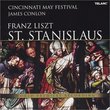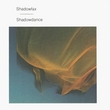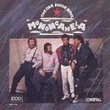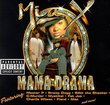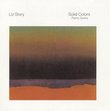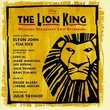| All Artists: Franz Liszt, Helmuth Rilling, Gächinger Kantorei Stuttgart, Iris Vermillion, Henriette Bonde-Hansen, Michael Schade Title: Liszt: Christus Members Wishing: 0 Total Copies: 0 Label: Hanssler Classics Original Release Date: 1/1/2000 Re-Release Date: 2/29/2000 Genre: Classical Style: Opera & Classical Vocal Number of Discs: 3 SwapaCD Credits: 3 UPC: 040888812128 |
Search - Franz Liszt, Helmuth Rilling, Gächinger Kantorei Stuttgart :: Liszt: Christus
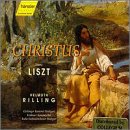 | Franz Liszt, Helmuth Rilling, Gächinger Kantorei Stuttgart Liszt: Christus Genre: Classical
|
Larger Image |
CD DetailsSimilar CDsSimilarly Requested CDs
|
CD ReviewsTo hear "Christus" as Liszt conceived it, buy this CD! Mark S. Carpenter | Austin, TX USA | 02/16/2000 (5 out of 5 stars) "I'm going to preamble my comments by saying I know this particular score very, VERY well: I was the person who advocated for the first 20th century performance (in the US) of "Christus" at Indiana University School of Music, which we performed in 1976. Given that: I cannot imagine this piece being performed any better than has been done by Mr. Rilling. Mr. Rilling has not merely synthesized the music: he has personalized the score! Rilling's realization of Liszt's score is a marvelously restrained performance -- yet it brings forth the essential "bigness" of the music (this is, after all, a late 19th century oratorio) while not ever allowing the music to become "cheap" or "gaudy".Liszt is an amazingly uneven composer. It's hard to imagine that the person who composed "Christus" is the same person who composed the "Grand Galop Chromatique"! Yet "Christus" is music-making on the very highest order -- this is a score which can stand comparison with Beethoven's "Missa Solemnis" and Brahms' "German Requiem" and hold its head high along side these greatest of masterpieces. One senses that Liszt truly meant every note he wrote in this score.There is some really sublime music all throughout Christus. The opening "Rorate Coeli" is reminiscent of very late Beethoven (and every bit as good!) - marred very slightly by some extraneous noise (perhaps backstage?). That noise is the only flaw I found in the entire 3 CD-set! The "Pastorale" and "March of the Three Wise Magi" strongly suggest Mahler by way of Liszt's use of small chamber groups as a part of a very large orchestra. The Pastorale, especially, is amazing music, especially considering it was written around 1863! The "Pater Noster" is gorgeous. I cannot imagine a more compelling performance of this movement. "The Miracle" (a portrayal of Jesus calming the waters during the storm at sea) is equally fine. It is NOT easy to bring forth all the orchestral colors and the harmonic audacity Liszt has written in this piece without the piece sounding gaudy - but Rilling certainly pulled it off! Rilling really saves the best for last: "Tristis Est Anima Mea" out-Wagner's Richard Wagner for use of chromatic writing (even approaching atonality at some points!). Wagner's "Tristan" chord figures predominately in the first half of the movement - and I dare say Wagner would have envied Liszt in the use of that particular chord progession (which Liszt, after all, used first in one of his art songs). For sheer mind-blowing spectacle, nothing beats the last movement, "Resurrexit". Rilling's interpretation of this movement reminds me a bit of the ending of Mahler's "Eighth Symphony" -- and this interpretation works! I am amazed that the chorus could sing (and enunciate) the "Christus Vincit" fugue at the tempo Rilling chose -- but sing and enunciate they did! I admit to being a bit of a "snob" about performances of "Christus", especially since the performance we undertook at Indiana University was a pet project of mine. I hate to say it -- but Rilling's performance was better than ours! In fact, I would say that Rilling's interpretation comes very close to an authoritative realization of this score as one is going to come!" A nearly perfect rendition Peter Czipott | San Diego, CA United States | 04/18/2003 (5 out of 5 stars) "I cannot claim anywhere near the authority of Mr. Carpenter, but while I second nearly everything he says in his fine review, we part company when it comes to the March of the Three Kings movement. It is incredibly hard to catch the right combination of vigor and spiritual afflatus in this march without descending into bombast, and I feel Maestro Rilling erred on the side of good taste, with the result that the piece goes at too low an emotional temperature and the miraculous release at the climax of the movement is underplayed. For me, the definitive performance of this movement remains the piano transcription of Ervin Nyiregyhazi, warts and all. This one reservation apart, I cannot recommend Rilling's traversal of Christus highly enough. Put this recording in your shopping cart now!"
|

 Track Listings (5) - Disc #1
Track Listings (5) - Disc #1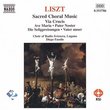
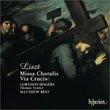

![Liszt: Piano Works [Box Set]](https://nationalbookswap.com/cd//m/18/4318/6094318.jpg)
